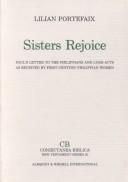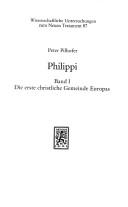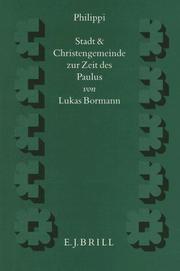| Listing 1 - 10 of 11 | << page >> |
Sort by
|
Book
Year: 1937 Publisher: Paris : E. De Boccard,
Abstract | Keywords | Export | Availability | Bookmark
 Loading...
Loading...Choose an application
- Reference Manager
- EndNote
- RefWorks (Direct export to RefWorks)
Book
ISBN: 9789602043363 9782869582712 Year: 2014 Publisher: Athènes : Éditions Melissa : École française d'Athènes,
Abstract | Keywords | Export | Availability | Bookmark
 Loading...
Loading...Choose an application
- Reference Manager
- EndNote
- RefWorks (Direct export to RefWorks)
Excavations (Archaeology) --- Excavations (Archaeology) --- Fouilles (Archéologie) --- Philippi (Extinct city) --- Philippes (Ville ancienne) --- History. --- Histoire religieuse
Book
ISBN: 9782869582637 2869582633 Year: 2014 Volume: 6 Publisher: Athènes : Paris : Ecole française d'Athènes ; diff. de Boccard,
Abstract | Keywords | Export | Availability | Bookmark
 Loading...
Loading...Choose an application
- Reference Manager
- EndNote
- RefWorks (Direct export to RefWorks)
Inscriptions, Greek --- Inscriptions, Latin --- Political participation --- Inscriptions grecques --- Inscriptions latines --- Participation politique --- Philippi (Extinct city) --- Philippes (Ville ancienne) --- History --- Sources --- Histoire --- Epoque des conquêtes romaines --- Politique et gouvernement --- Philippes (Grèce) --- Philippes (ville ancienne) --- Sources. --- Antiquités
Book
Year: 1993 Publisher: [Athens] : Académie d'Athènes,
Abstract | Keywords | Export | Availability | Bookmark
 Loading...
Loading...Choose an application
- Reference Manager
- EndNote
- RefWorks (Direct export to RefWorks)
Romans --- Romans --- Romains --- Romains --- Philippi Region (Extinct city) --- Greece --- Philippes (Ville ancienne) --- Grèce --- Historical geography. --- Géographie historique
Book
ISBN: 9782869582804 2869582803 Year: 2016 Volume: 55 Publisher: Athènes École française d'Athènes
Abstract | Keywords | Export | Availability | Bookmark
 Loading...
Loading...Choose an application
- Reference Manager
- EndNote
- RefWorks (Direct export to RefWorks)
Excavations (Archaeology) --- Human settlements --- Architecture, Ancient --- Fouilles (Archéologie) --- Etablissements humains --- Architecture antique --- Philippi (Extinct city) --- Philippes (Ville ancienne) --- History --- Histoire religieuse --- Antiquities. --- Greece --- History. --- Antiquités. --- Histoire. --- Crenides (Extinct city) --- Fílippoi (Extinct city) --- Krenides (Extinct city) --- Philippes (Extinct city) --- Philippi (City) --- Philippoi (Extinct city) --- Antiquities --- Fouilles (Archéologie) --- Fouilles archéologiques --- -Antiquities. --- Philippes (ville ancienne) --- Histoire --- Philippoi (Greece : Extinct city) --- Philippi (Extinct city) - History
Book
ISBN: 9783161491634 3161491637 Year: 2009 Volume: 119 Publisher: Tübingen Mohr Siebeck
Abstract | Keywords | Export | Availability | Bookmark
 Loading...
Loading...Choose an application
- Reference Manager
- EndNote
- RefWorks (Direct export to RefWorks)
Excavations (Archaeology) --- Inscriptions, Greek --- Inscriptions, Latin --- Fouilles (Archéologie) --- Inscriptions grecques --- Inscriptions latines --- Translations into German --- Traductions allemandes --- Bible. --- Criticism, interpretation, etc. --- Philippi (Extinct city) --- Philippes (Ville ancienne) --- Church history --- History --- Sources --- Histoire religieuse --- Histoire --- Fouilles (Archéologie) --- Excavations (Archaeology). --- Greece --- Church history. --- History. --- Sources.

ISBN: 912201201X 9789122012016 Year: 1988 Volume: 20 Publisher: Stockholm Almqvist & Wiksell
Abstract | Keywords | Export | Availability | Bookmark
 Loading...
Loading...Choose an application
- Reference Manager
- EndNote
- RefWorks (Direct export to RefWorks)
Bible--Femmes --- Bible--Women --- Bijbel--Vrouwen --- Femmes dans la Bible --- Moeders--Bijbelleer --- Mothers--Biblical teaching --- Mères--Enseignement biblique --- Vrouwen in de Bijbel --- Women in the Bible --- Chrétiennes --- 227.1*5 --- Brief van Paulus aan de Filippenzen --- 227.1*5 Brief van Paulus aan de Filippenzen --- Bible. Philippians --- Criticism, interpretation, etc --- Bible. N.T. Luke --- Bible. N.T. Acts --- Women --- Macedonia --- History --- 1st century --- Chrétiennes - Grece - Philippes (Ville ancienne)

ISBN: 3161464796 3161465180 9783161464799 9783161465185 Year: 1995 Volume: 119 Publisher: Tübingen Mohr Siebeck
Abstract | Keywords | Export | Availability | Bookmark
 Loading...
Loading...Choose an application
- Reference Manager
- EndNote
- RefWorks (Direct export to RefWorks)
Excavations (Archaeology)
---
227.1*5
---
-Archaeological digs
---
Archaeological excavations
---
Digs (Archaeology)
---
Excavation sites (Archaeology)
---
Ruins
---
Sites, Excavation (Archaeology)
---
Archaeology
---
Brief van Paulus aan de Filippenzen
---
Philippi (Extinct city)
---
Crenides (Extinct city)
---
Fílippoi (Extinct city)
---
Krenides (Extinct city)
---
Philippes (Extinct city)
---
Philippi (City)
---
Philippoi (Extinct city)
---
Greece
---
Church history.
---
History.
---
Antiquities
---
-Brief van Paulus aan de Filippenzen
---
227.1*5 Brief van Paulus aan de Filippenzen
---
-227.1*5 Brief van Paulus aan de Filippenzen
---
Archaeological digs
---
Philippes (Ville ancienne)
---
930.271 <38 PHILIPPI>
---
Epigrafie--

ISBN: 9004102329 9004267247 9789004267244 9789004102323 Year: 1995 Volume: 78 Publisher: Leiden Brill
Abstract | Keywords | Export | Availability | Bookmark
 Loading...
Loading...Choose an application
- Reference Manager
- EndNote
- RefWorks (Direct export to RefWorks)
The Roman colony of Philippi is the site upon which Paul founded his first European congregation. There, he encountered a political entity which bore the stamp of Roman culture through and through. Part I describes Philippi's political and religious situation based on numismatic, epigraphical, archaeological and literary sources. Part II reconstructs the relationship between Paul, the congregation, and the city of Philippi, and demonstrates the influence which the Roman environment exerted on the church's organization and preaching. The work reaches the conclusion that the Philippean community assumed an active and self-confident role in implementing its mission. In so doing, it clashed with the Roman authorities and their insistence upon a religious praxis that did not call into question the principles or existence of the Roman State. The book contributes to the interpretation of the Epistle to the Philippians as well as to the history of early Christianity and the history of Religions during the first century.
Excavations (Archaeology) --- Fouilles (Archéologie) --- Bible. --- Criticism, interpretation, etc --- Critique, interprétation, etc. --- Philippi (Extinct city) --- Philippes (Ville ancienne) --- Church history --- History --- Histoire religieuse --- 227.1*5 --- -Archaeological digs --- Archaeological excavations --- Digs (Archaeology) --- Excavation sites (Archaeology) --- Ruins --- Sites, Excavation (Archaeology) --- Archaeology --- Brief van Paulus aan de Filippenzen --- Crenides (Extinct city) --- Fílippoi (Extinct city) --- Krenides (Extinct city) --- Philippes (Extinct city) --- Philippi (City) --- Philippoi (Extinct city) --- Greece --- Church history. --- History. --- Antiquities --- Theses --- -Brief van Paulus aan de Filippenzen --- 227.1*5 Brief van Paulus aan de Filippenzen --- -227.1*5 Brief van Paulus aan de Filippenzen --- Archaeological digs --- Fouilles (Archéologie) --- Criticism, interpretation, etc. --- Critique, interprétation, etc. --- Epistle of Paul to the Philippians --- Epistle to the Philippians --- Letter of Paul to the Philippians --- Philippians --- Pillipo (Book of the New Testament) --- Philippoi (Greece : Extinct city) --- Bible. Philippians --- Christianity --- Primitive and early church, ca. 30-600 A.D. --- Pillipo (Bible of the New Testament) --- Europe --- Excavations (Archaeology) - Greece - Philippi (Extinct city)
Book
ISSN: 03042456 ISBN: 9782869582996 2869582994 9782869583580 2869583583 Year: 2018 Volume: 59 Publisher: Athènes : Ecole française d'Athènes,
Abstract | Keywords | Export | Availability | Bookmark
 Loading...
Loading...Choose an application
- Reference Manager
- EndNote
- RefWorks (Direct export to RefWorks)
Fondée en terre thrace par le roi Philippe II de Macédoine, la cité grecque de Philippes fut, au cours de l’automne 42 av. J.-C., le théâtre de l’affrontement décisif entre l’armée des républicains Brutus et Cassius et celle des héritiers de César, Antoine et Octave. À l’issue de la bataille, Antoine décida de tirer profit du vaste territoire environnant pour y établir les vétérans des légions qui avaient combattu et pour fonder une colonie romaine. S’appuyant sur une riche documentation épigraphique, ce livre reconstitue la structure et le fonctionnement des institutions de l’entité politique qui fut substituée à la cité grecque à cette occasion, ainsi que la formation des élites dirigeantes de la colonie et les dynamiques démographiques, sociales et culturelles qui animèrent ce groupe durant plus de trois siècles, de la fondation de la colonie à la fin du iiie s. apr. J.-C. Par le biais de comparaisons avec les autres colonies fondées par Rome dans les provinces orientales de l’Empire, avec les cités grecques et avec les municipes et colonies d’Occident, l’étude s’efforce de replacer Philippes dans le cadre général des communautés locales de l’Empire romain, aussi bien que dans son contexte régional immédiat. À travers l’exemple de Philippes, ce livre montre que, bien loin d’avoir été des images statiques de Rome comme le prétend la formule célèbre d’Aulu-Gelle, les colonies, quoique dotées d’institutions calquées sur un archétype élaboré à Rome, en étaient plutôt des ramifications vivantes et autonomes, sensibles à leur environnement provincial et disposant chacune d’une coloration particulière. Founded on Thracian soil by Macedonian king Philip II, Philippi witnessed the final battle between the Republican army of Brutus and Cassius and the army of Antony and Octavian, the heirs to Caesar. In the aftermath of the battle, which took place in the fall of 42 BCE, Antony decided to take advantage of the large surrounding territory, settling the veterans of the…
Constitutional history --- Political participation --- Philippi (Extinct city) --- Rome --- History --- Sources. --- Colonies --- Participation politique --- Philippes (ville ancienne) --- Histoire --- Sources --- Histoire constitutionnelle --- Greece --- History. --- Histoire constitutionnelle. --- Citizen participation --- Community action --- Community involvement --- Community participation --- Involvement, Community --- Mass political behavior --- Participation, Citizen --- Participation, Community --- Participation, Political --- Political activity --- Political behavior --- Political rights --- Social participation --- Political activists --- Politics, Practical --- Constitutional history, Modern --- Constitutional law --- Constitutions --- Crenides (Extinct city) --- Fílippoi (Extinct city) --- Krenides (Extinct city) --- Philippes (Extinct city) --- Philippi (City) --- Philippoi (Greece : Extinct city) --- Rim --- Roman Empire --- Roman Republic (510-30 B.C.) --- Romi (Empire) --- Byzantine Empire --- Rome (Italy) --- Antiquities --- E-books --- Constitutional history - Greece - Philippi (Extinct city) --- Political participation - Greece - Philippi (Extinct city) --- Philippi (Extinct city) - History - Sources --- Rome - Colonies - History - Sources --- Greece - Philippi (Extinct city) --- Philippi (Extinct city) - History. --- Rome - Colonies - History --- Spätantike --- römisches reich --- Griechische Welt --- soziale organisation --- antike geschichtsschreibung --- grieschische stadt --- Colonies romaines
| Listing 1 - 10 of 11 | << page >> |
Sort by
|

 Search
Search Feedback
Feedback About UniCat
About UniCat  Help
Help News
News